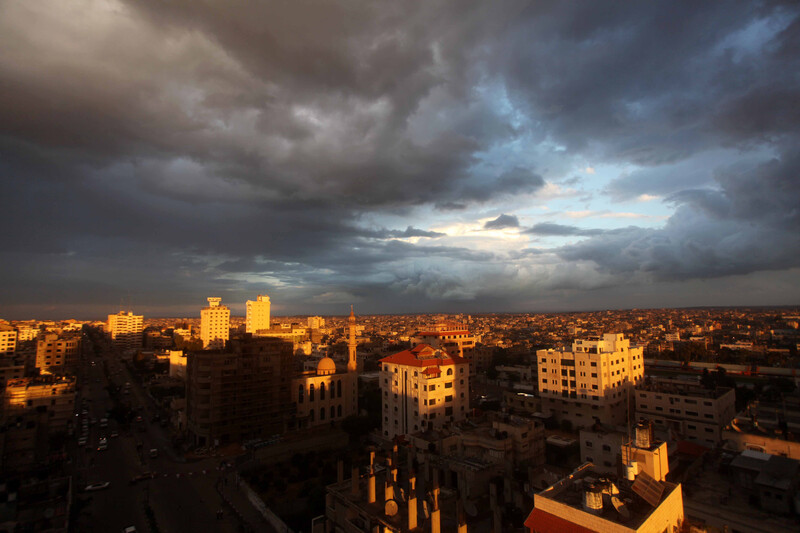The Electronic Intifada Gaza Strip 15 November 2012

Palestinians in Gaza want to live normal lives and raise their children in a safe environment.
APA images“What do they want from us? What do they want from us?” — this is the question posed to me by my son Munir who is now 13 years old. I had just returned from touring nearby towns here in Gaza out of journalistic duty on the second day of Israel’s massive military attacks.
Since the Israeli assassination of a top Hamas military commander yesterday afternoon, I have been following up on the news, reporting and writing the story of 13-year-old Ahmad Abu Daqqa, who was fatally shot in the stomach by an Israeli soldier last week while he played football outside his home in Khan Younis.
Munir and Ahmad are both schoolboys and each have a hobby. Ahmad was a football fan, while Munir is interested in news like his father. Whenever Munir approaches me, it’s inevitably to tell me some news or inquire about something.
Both Ahmad and Munir have spent their childhoods in the harsh, intolerable conditions in Gaza. As they were both similar in age and in terms of living conditions, they surely had the same question: ” What do they want from us?”
Ahmad has already got the answer. He was killed last Thursday by an Israeli bullet that ripped through his little body.
Meanwhile, Munir is outraged by the intensity of Israeli air strikes on Gaza, worried for the safety of his brother, two sisters, mother and other family members whenever a loud explosion is heard nearby. He wanted an authentic answer from his journalist father.
I wracked my mind for an answer that he could understand.
My wish for peace
I have always believed in peace. I have always believed in coexistence and I have always stayed away from violence. When I was a child like Munir, the first Palestinian uprising of 1987 broke out. Since then, I have believed in my right as a human being to live in freedom in a clean environment.
I recall that around that time, then secretary-general of the United Nations Javier Perez de Cuellar was visiting the occupied Gaza Strip in an observation mission. I picked up a broom and started cleaning the front door of my family home in Maghazi town in the central Gaza Strip.
“Ah, I see you are cleaning, apparently for the UN envoy who is coming over,” Ibrahim Mansour, an older neighbor of mine, told me while I was sweeping. I answered him: yes, I want these people to know that we are a life-loving nation!
This has truly been my dream. When I was able to join a UN-run media training program in New York City in 2001, I felt great, interacting with UN officials including Kofi Annan, the secretary-general at the time. I immediately talked about the people of Gaza. I mentioned the same cleaning story to the chief of the Palestine and Decolonization Center of the UN, Salim Fahmawi, who was in charge of the training program as well.
Since my return from the UN training program, I have dedicated my career to the sake of peace and coexistence, working relentlessly to tell the people outside Gaza that the Palestinians are a nation who love life and badly want to live normally like any other nation.
Do not even dream
Back to Munir’s question. Despite the fact that I do believe strongly in the power of peace instead of war, I felt I had to properly answer my son. “What do they want?” I exclaimed to Munir. “What they want is obviously to deprive us of our humanity, taking away our dream to live normal lives like other nations, and to throw us into the ocean.”
Munir got a theoretical answer that he might not understand now. His memory is still collecting images, only without processing those images into facts and figures. Yet the slain child Ahmad Abu Daqqa and his family got a clear-cut answer from the Israelis themselves: You are not allowed to play football, even outside your front door. You are not allowed to enjoy yourselves. You are not even allowed to live.
Munir is now locked inside my Maghazi home along with his brother Muhammad and his two sisters, Aseel and Nadine, and their mother, Um Munir, watching a TV filled with horrible images from the current Israeli military escalation.
Munir and Muhammad are not allowed now to even play games on their computer, as I am occupying the room for important work, filled with tension, worry and stress.
Wait. Munir has just told me that the Rafah crossing terminal on the Egyptian side of Gaza’s southern border is now fully prepared to welcome possible injuries from the Gaza Strip, to be medicated in nearby Egyptian hospitals!
Rami Almeghari is a journalist and university lecturer based in the Gaza Strip.





